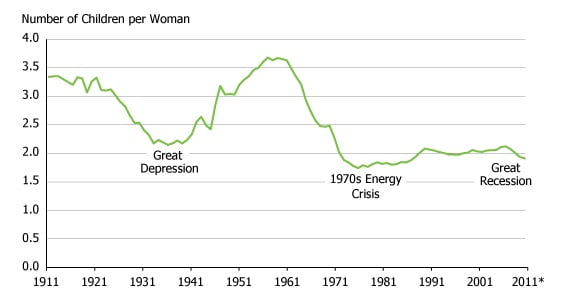Fertility rates in the United States have dropped to an all-time low in recent years, a trend many experts believe is tied to the economic aftershock of the Great Recession in 2007. In order to address fertility problems, many women turn to in-vitro fertilization (IVF) methods, which involve removing eggs, fertilizing them with sperm in the lab and re-injecting them into the woman’s ovaries. Other women have taken to regular hormone treatments in order to up their egg count, and still others use traditional thermometers and holistic methods.
But the difficulty of conceiving for many women may now be relieved due to a new discovery by researchers at Tel Aviv University and Sheba Medical Center that was effective in boosting the fertility lifespan of lab mice by up to 20 percent.
SEE ALSO: Antioxidants Could Reduce Your Chances Of Getting Pregnant
Their new research reveals a linkage between the genes of the innate immune system — immunity with which human beings are born, rather than immunity they acquire during their lives — and ovarian longevity. The study, published recently in the “Proceedings of the National Academy of Sciences,” was the doctoral work of Dr. Shiri Uri-Belapolsky, overseen by Prof. Ruth Shalgi.
According to research conducted on laboratory mice, the genetic deletion of the protein Interleukin-1 (IL-1), a key player in the innate immune system, could improve the number of eggs available for fertilization as well as improve the ovarian response to hormonal stimulation involved in IVF procedures. This could prove especially effective in women who initially respond poorly to hormonal treatment.
”We revealed a clear linkage between the genes of the innate immune system and female reproduction,” said Dr. Uri-Belapolsky. “The results of our study, which point to neutralizing the effects of the IL-1 protein to slow down the natural processes that destroy the eggs, may set the basis for the development of new treatments, such as an IL-1 blockade that would raise the number of eggs recovered during an IVF cycle and reduce the amount of hormones injected into women undergoing the treatment.”
The connection between IL-1 and fertility was discovered by accident in the course of research performed by the scientists on the role of IL-1 in atherosclerosis, or the hardening of the arteries. In a surprise result of the research, the fertility lifespan of IL-1-deficient mice was found to be up to 20 percent longer than that of control mice.
Sign up for our free weekly newsletter
SubscribeKeeping the clock ticking
Female mammals, including humans, are born with a finite number of eggs and are subject to a biological clock that dictates the end of the reproductive lifespan at around 50 years of age. Over the past decade, a trend of postponing childbearing into advanced age has led to a corresponding upward trend in the number of IVF treatments. “Identifying a possible culprit, such as Interleukin-1, may offer new insight into the mechanisms responsible for egg loss as well as practical interventions,” the study reports.
SEE ALSO: Mom’s Stress During Pregnancy Affects Baby’s Iron Levels
“Our revelation is secured with a patent application, and naturally, further study in mice and in humans is required to examine this therapeutic opportunity,” said Prof. Shalgi. “I believe we will take this research forward into human clinical trials. However, there is still research to be done before we can start these trials.”
Dr. Shiri Uri-Belapolsky is at doctoral student at TAU’s Sackler School of Medicine and the research was overseen by Prof. Ruth Shalgi, of the Department of Cell and Developmental Biology, Dr. Yehuda Kamari and Prof. Dror Harats of TAU’s Sackler Faculty of Medicine and Sheba Medical Center, and Dr. Aviv Shaish of Sheba Medical Center.
Related posts

Israeli Medical Technologies That Could Change The World

Harnessing Our Own Bodies For Side Effect-Free Weight Loss

Missing Protein Could Unlock Treatment For Aggressive Lung Cancer






Facebook comments